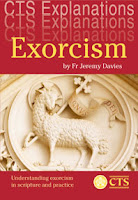Good pamphlet on exorcism
 The Catholic Truth Society kindly sent me a copy of a pamphlet on exorcism by Fr Jeremy Davies which was published last month. You can order it online: "Exorcism. Understanding exorcism in scripture and practice." (A6. 56 pages £1.95)
The Catholic Truth Society kindly sent me a copy of a pamphlet on exorcism by Fr Jeremy Davies which was published last month. You can order it online: "Exorcism. Understanding exorcism in scripture and practice." (A6. 56 pages £1.95)I was interested in this because my course in Sacramental Theology includes an excursus on indulgences and sacramentals. I include exorcism under the latter heading although after reading Manfred Hauke's article in the periodical Antiphon (Vol 10. 2006), I think I should clarify that exorcism should be regarded as something other than a sacramental instituted by the Church. Hauke's article is not available online but a companion article is: Daniel G. Van Slyke, "The Ancestry and Theology of the Rite of Major Exorcism (1999/2004)"
Fr Davies' pamphlet is offers a sensible and pastoral introduction to the subject with some practical advice. He looks a the different kinds of demonic influence in the world, its causes and degrees, ways of discernment and diagnosis and how to seek help. He emphasises the importance of conversion and spiritual renewal: the sincere desire to live a good spiritual life which is the thing most hated by the devil.
One question which has bothered me is that of the precise difference between a major and a minor exorcism. Fr Davies locates the distinction in the kind of demonic activity. A major exorcism is carried out in the case of genuine possession where a person's will lacks control over some part of himself (the will is never entirely blotted out); and, to the extent that the person's will is in control, he has good will the person has good will; i.e. he seeks to follow Christ. (Fr Davies points out that Jesus did not exorcise Judas nor Peter Ananias, nor Paul Elymas.)
Regarding simple (minor) exorcisms, there is an interesting quotation from Noldin which I followed up the other day. The renowned moralist said:
"It is much to be desired that ministers of the Church should perform simple exorcisms more frequently, remembering the words of the Lord, 'In my name they shall cast out demons' ... They should use this,m or a similar formula: 'In the name of Jesus Christ I command you, unclean spirit, to leave this creature of God.'"Priests should also follow the advice of Tanquerey not to tell the penitent about this if there is any fear of undue excitement or worry but simply say that he is going to recite a prayer approved by the Church. (He could say it in Latin or quietly.)
From the point of view of apologetics, I was glad to find the point made that Christ clearly distinguished between possession and illness.
"And he healed many who were sick with various diseases, and cast out many demons" (Mark 1.34)Similarly Mk 16.17-18, and Matt 10.1 & 8. Also in Mark's gospel, one deaf and dumb man is healed (Mk 7.33-35) while another is exorcised (Mk 9.25-27)
I recommend this pamphlet as a good introduction to a subject that we should be aware of but not obsessed by. There is always a danger that we talk too much about these things. The most effective weapons against the devil are prayer, the sacraments, and the virtue of charity. He hates all that.
